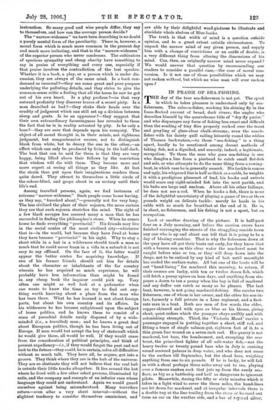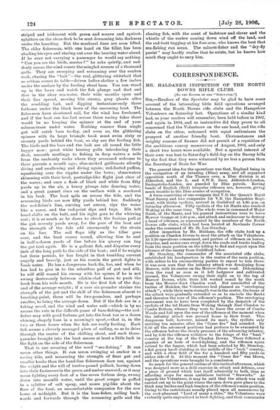IN PRAISE OF SEA-FISHING.
T"day of the true sea-fisherman is not yet. The sport in which he takes pleasure is understood only by sea- fishermen. The salmon-fisher, working hie shining fly in the foam-flecked current of broad, dark rivers; the angler who describes himself by the quarrelsome title of "dry-tiy purist." and who disparages any form of fishing less exact and difficult than the sending of tiny flies properly cocked over the trout and grayling of glass-clear chalk-streams; even the roach. fisher with his dainty quill sailing leisurely round the eddies of Thames backwaters—to those "aea-fishing " is a thing apart, hardly to be mentioned among decent methods of taking fish, not a dignified, and scarcely, indeed, a legitimate, occupation. To them the man who goes sea-fishing is one who dangles a line from a pierhead to catch small fiat-fish and eels, or who attempts to do the same thing from a rowing- boat, in which case he is generally seasick. His tackle is coarse and ugly, his whipcord line is half as thick as a cable, he weights it with a prodigious plummet of lead, his hooks and swivels would scare any right-minded fish into the next parish, and his baits are large and unclean. Above all his other failings, he does not use a rod. When he hooks a fish, there is none of the delightful uncertainty of playing a game of two or three pounds weight on delicate tackle: merely lie hauls in his cable with so much for breakfast at the end of it. He is, in short, no fisherman, and his fishing is not a sport, but an occupation.
Look at another drawing of the picture. It is half-past four on a July morning, and before the carrion crows have finished scavenging the streets of the straggling seaside town anyone who is up and about can tell that it is going to be a day of blazing sunshine. That is why the fishermen down at the quay have all got their boat, out early, for they know that with a brazen sun on this clear water the mackerel must be caught before nine or ten, or they will drop down into the deeps, not to be enticed by any kind of bait until moonlight has cooled the surface-water. All but one of the boats will be out "band-lining" for mackerel this morning, to return, if their owners are lucky, with ten or twelve dozen fish, which will fetch a penny apiece on lean days, and anything from six- pence a dozen to ten a penny when the bay is full of mackerel and any duffer can catch as many as he pleases. The last boat, however, is not going mackerel-fishing. She carries two fishermen, one of whom is her owner, and the other his son-in- law, formerly a full private in a Line regiment, and a first. rate man in a boat. Both are men of few words, the elder, copper-skinned and with eyes as blue as his blouse, giving short, quietorders which the younger obeys swiftly and with astonishing strength. Third, the 'Victoria Maud' carries a passenger engaged in putting together a short, stiff rod, and fitting a trace of single salmon-gut, eighteen feet of it, to a thin green line wound on a seven-inch reel. His quarry is not mackerel, but bass, the handsomest, and, excepting the sea. trout, the princeliest fighter of all salt-water fish,—not the heavy twelve or twenty pound bass who in July is cruising round seaweed palaces in deep water, and who does not come to the surface till September, but the shoal bass, weighing anything from one to six pounds. If Ile is lucky, he will fall in with a shoal perhaps three miles away out to sea, playing over a famous sunken rock that juts up from the sandy sea- floor, as big as a battleship and half as dangerous to ignorant pilots. Meanwhile, during the fifty or sixty minutes which it takes in a light wind to cover the three miles, the hand-lines are let down for mackerel, and at irregular intervals there is a double tug at the line trailing from the stern or boomed out from an ear on the weather side, and a bar of tapered silver,
striped and iridescent with green and mauve and apricot, splatters on the clean deck to be sent drumming into darkness under the boarding. But the mackerel lines are soon lifted.
The elder fisherman, with one hand on the tiller, has been shading his eyes and staring out over the heaving water ahead.
If he were not carrying a passenger he would say nothing.
"Can you see the birds, master P" he asks quietly, and sud- denly across the wind comes the mingled scream of a thousand gulls. They are swooping and screaming over the sunken rock, chasing the "bait"—the real, glittering whitebait that so seldom comes to table—driven helter-skelter a few inches under the surface by the feeding shoal bass. You can stand up in the bows and watch the fish plunge and dart and dive in the clear sea-water, their wide mouths open and their fins spread, moving like strong, grey ghosts after the scudding bait, and dipping instantaneously three fathoms under the black bows of the Oncoming boat. The fishermen have shortened sail, for the wind has freshened, and if the boat ran too fast across these racing tides there would be no keeping the spinner at the end of your salmon-trace under water. Nothing coarser than single gut will catch bass to-day, and even so, the glittering spinner with its large triangle book must swim sixty or seventy yards behind the boat, so shy are the feeding fish. The birds and the bass and the bait are all round the little lugger now : great white herring gulls introducing their drab, uncouth nestlings to fishing in deep waters a mile from the uncleanly rocks where they screamed welcome to their parents a month ago ; slim-necked guillemots silently diving and swallowing and diving again; red-footed puffins, squattering over the ripples under the bows; sbearwaters skimming with their level, partridge-like flight just clear of the waves ; and once a flash of black and white from fifty yards up in the air, a heavy plunge into dancing water, and a great gannet rises on the surface with a mackerel in his beak. The boat sails on across the tide, and the screaming birds are now fifty yards behind her. Suddenly the rod-fisher's line, curving out astern, rips the water like a razor, and the rod-point dips and tugs. His left band shifts on the butt, and his right goes to the whirring reel ; it is as much as he dares to check the furious pull at the gut seventy yards away, for the pace of the boat and the strength of the tide add enormously to the strain on his line. The sail flaps idly as the tiller goes over, and the boat comes round, allowing him to reel in half-a-dozen yards of line before his quarry can tug the gut taut again. He is a gallant fish, and disputes every inch of the long path to the side of the boat ; and if he weighs but three pounds, be has fought in that tumbling current angrily and bravely, just as his cousin the perch fights in fresh water. He hiss a dangerous back-fin, too, and when he has had to give in to the relentless pull of gut and silk, he will still wound his enemy with his spines, if he is not swung dexterously between oilskin-clad knees to push the hook from his wide mouth. He is the first fish of the day, and of the average weight ; if a rare six-pounder strains the strength of the gut and the skill of the fisherman almost to breaking-point, there will be two-pounders, and perhaps smaller, to bring the average down. But if the fish are in a taking mood, and the wind and water suit—which is by no means the rule in the difficult game of bass-fishing—the rod- fisher may with good fortune get into the boat ten or a dozen shining, shapely bass in a morning's sport,—that is, in the two or three hours when the fish are really feeding. Each fish means a cleverly managed piece of sailing, so as to drive through the centre of the shifting shoal, and each three- pounder brought into the boat means at least a little luck in the fight on the side of the fisherman.
That is one meaning of the word "sea-fishing." It can mean other things. It can mean swinging at anchor in a racing tide, and measuring the strength of finer gut and smaller hooks than the hand-line fisherman dare Ilse, against the weight and the will of twelve-pound pollack, boring down into their fastnesses in the green and umber seaweed; or it may mean fighting every foot of a line seven fathom deep, swung down into moonlit water, until the great conger is gaffed in a splatter of salt spray, and noses pig-like about the floor of the boat, an uncomfortable companion for the row home at midnight. But it is the bass-fisher, sailing back- wards and forwards through the screaming gulls and the
chasing fish, with the scent of bedstraw and clover and the whistle of the curlew coming down wind off the land, and, the rod-butt tugging at his fore-arm, who knows the best that sea-fishing can mean. The salmon-fisher and the "dry-fly purist" may hardly realise that he exists, but he knows how much they ought to envy him.







































 Previous page
Previous page